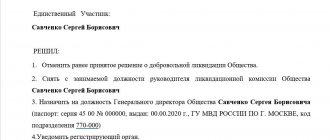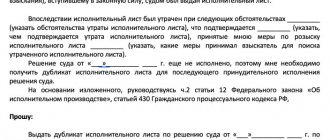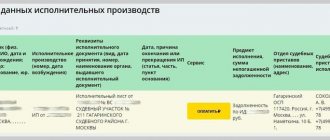Enforcement of the requirements contained in executive documents is entrusted to the Federal Bailiff Service and its territorial bodies. The direct implementation of enforcement functions is assigned to bailiffs of the territorial divisions of the FSSP of Russia.
In accordance with Article 12 of the Federal Law of October 2, 2007 N 229-FZ “On Enforcement Proceedings,” one of the types of enforcement documents sent (submitted) to the Federal Bailiff Service is a writ of execution issued by arbitration courts and courts of general jurisdiction on the basis of decisions their decisions.
Withholding under executive documents: general provisions
An executive document received by the organization in the name of an employee is the basis for collecting from the employee’s salary the amounts specified in the document.
An executive document can be: (click to expand)
- performance list;
- certificate issued by the labor dispute commission;
- act of regulatory authorities on the collection of credit debt and accrued interest;
- a judicial act issued in accordance with the Code of Administrative Offences;
- order of bailiffs;
- a notary's writ of execution on an agreement on out-of-court dispute resolution.
In accordance with the provisions of Federal Law 223, the employer is obliged to make deductions from the moment of receipt of the writ of execution.
In order to make penalties, the employee's consent is not required. The employer only needs to notify the employee in writing (the employee’s signature “Notified” on the writ of execution), after which the accountant has the right to withhold the amounts in the manner established by the writ of execution.
General approach
The legal relations that arise between the claimant, the debtor and the bank during the execution of the enforcement document by the bank are subject to the provisions of the Federal Law of October 2, 2007 No. 229-FZ “On Enforcement Proceedings” (hereinafter referred to as the Law on Enforcement Proceedings).
Part 1 of Art. 8, parts 5 and 7 art. 70 of the Law on Enforcement Proceedings establishes the possibility of sending a writ of execution for the collection of funds directly by the collector to the bank that services the debtor’s accounts.
If the debtor receives funds in respect of which Art. 99 of the Law establishes restrictions and/or which, in accordance with Art. 101 of the Law, foreclosure cannot be made; the bank servicing these accounts calculates the amount that can be foreclosed on, taking into account the requirements.
The procedure for calculating the amount of funds in the account that can be foreclosed on or seized, taking into account the requirements of Art. 99 and 101 of the Law on Enforcement Proceedings was approved by Order of the Ministry of Justice dated December 27, 2019 No. 330.
Disputes arising between the claimant, the debtor and the bank during the execution of the writ of execution by the bank are considered by the courts in the manner of civil and administrative proceedings.
Let us note that in the review under consideration, the RF Supreme Court does not provide details of specific court decisions.
When do you need to return the writ of execution to the bailiffs?
Article 46 of Federal Law No. 229 provides for the procedure for returning a writ of execution to bailiffs. According to the law, the employer is obliged to return the writ of execution to the bailiff service in the following cases:
- dismissal of the debtor from his place of work;
- death of the defendant;
- full satisfaction of claims;
- inability to locate the defendant;
- termination of collections based on the request of the plaintiff (recipient of funds).
Below we will describe in detail the procedure for returning a writ of execution for each of the above cases.
Return of the writ of execution to the bailiffs after fulfillment of the requirements
In general, the return of the writ of execution to the bailiffs is made upon the defendant’s fulfillment of all the requirements stipulated by the writ of execution. Let's consider typical cases:
- The defendant repaid the amount owed. Let us assume that, on the basis of a writ of execution, the employer made penalties for compensation for damage caused, while the amount of compensation in the document is indicated in a fixed monetary amount. In this case, the organization returns the writ of execution upon full repayment of the debt.
- The collection period has been terminated . In general, the employer withholds child support until the child turns 18 years old. If the text of the writ of execution contains this wording of the retention order, then upon the child’s 18th birthday, the plaintiff’s demands are considered fulfilled, which means the employer can return the writ of execution to the bailiff.
Explanations on issues arising in judicial practice
| QUESTION | ANSWER |
| How is the 7-day period calculated (Part 6, Article 70 of the Law on Enforcement Proceedings), for which the bank has the right to delay the execution of the enforcement document? | The period for which the bank has the right to delay the execution of a writ of execution begins the next day after the date of actual receipt of such a document. However, the 7-day period does not include:
|
| Is a writ of execution subject to execution by the bank if the claimant requests its partial execution? | If the writ of execution provides for the recovery of funds in a larger amount than the applicant requests when applying to the bank with an application for collection under the writ of execution, the bank is obliged to fulfill within the limits of the requirements stated by the recoverer. |
| Is a writ of execution subject to execution by the bank in relation to a person who has changed his name (last name, first name, patronymic) after the adoption of a judicial act? What documents should be presented to the bank by the creditor or debtor? | If the claimant or debtor changes the name (last name, first name, patronymic), the bank is obliged to accept the writ of execution for execution if data confirming the fact of such a change is provided. This may be a certificate of change of name, marriage registration certificate, divorce certificate, etc. |
Return of a writ of execution upon dismissal of an employee
Based on Federal Law-229, the employer is obliged to notify the FSSP of the impossibility of collecting amounts under the writ of execution in connection with the dismissal of the employee.
In this case, there is no need to prepare a cover sheet. The writ of execution must be returned to the FSSP along with the corresponding statement, in which you indicate: (click to expand)
- the amount of penalties made;
- the reason why it is not possible to continue withholding (employee dismissal);
- the employee’s new place of work, if it is known to the employer.
The application form can be downloaded here ⇒ Application for return of the writ of execution
The deadline for filing an application and returning the writ of execution is no more than 3 days from the date of dismissal of the employee.
Based on Art. 17.14 of the Code of Administrative Offenses, an employer who did not notify the FSSP of the dismissal of an employee within the prescribed period and did not return the writ of execution may be held liable in the following order:
- fine from 50,000 rubles. up to 100,000 rub. – for organizations;
- fine from 15,000 rubles. up to 20,000 rub. – for officials found responsible for an offense (chief accountant, manager).
Free legal consultation
Don’t put off solving your problem for later - call us right now: +7(351)215-97-00 Ask a question
online or write on social networks
on ““We understand the intricacies of ending enforcement proceedings””
- Valentina
:
12/07/2017 at 02:10
I read your material, everything is written clearly, but I can receive a court form from you by email. Thank you in advance!
Answer
- Company lawyer
:
08.12.2017 at 13:55
Hello, please write your email address.
Answer
- Catherine
:
12/13/2017 at 20:50
Good evening, I would like to receive a free consultation. My husband and I borrowed money from a dishonest woman, but we issued a receipt. The relationship was good and I was confident in this person. The time to return the money began to approach and our borrower began to fuss over and feed us breakfast. I realized that it would not be possible to resolve the dispute voluntarily in a pre-trial manner. So we went to court and hired a lawyer. We managed to win the full amount of the debt, but the joy did not last long. I had to deal with the bailiffs and test for myself how they work. Regarding production, the bailiff did not lift a finger, citing workload. I returned the writ of execution due to the impossibility of collecting the debt! Is this legal? I know that the debtor has a husband and she transferred all the property to him. Why didn’t the bailiff seize the spouse’s property?
Answer
- Company lawyer
:
12/16/2017 at 23:05
Hello. In order to foreclose on jointly acquired property, you need to go to court; the bailiff himself does not have the right to arrest and confiscate the property of the spouse. if transactions were carried out deliberately in order to transfer property to a third party, then they can be recognized as imaginary and terminated by the court, which will allow you to foreclose on this property (as part of enforcement proceedings). The bailiff has the right to return the writ of execution, but provided that all necessary measures have been taken, and to understand this, you need to familiarize yourself with the enforcement proceedings! Good luck!
Answer
- Natalia
:
01/18/2018 at 00:38
Hello, we won the case in court, but the defendant does not have the means to pay us the required amount. The bailiffs returned the documents on the basis that there was no property. As we understand, the case was not even considered. What should we do in this situation? And what documents should the bailiffs return to us?
Answer
- Company lawyer
:
01/19/2018 at 19:06
Most likely, the bailiffs simply sent inquiries about the availability of property to the registration authorities. It is likely that the debtor’s property is not registered; to be sure of this, the claimant needs to familiarize himself with the materials of the enforcement proceedings. If the bailiff illegally did not take measures to execute the writ of execution, then this is an illegal inaction. Inaction must be appealed in court (the most effective way). At the end of enforcement proceedings on the grounds of lack of property, the bailiff is obliged to send to the claimant the original writ of execution, an act on the impossibility of collection and a resolution on the completion of enforcement proceedings.
Answer
- Olga
:
03/18/2018 at 18:26
Good afternoon. The writ of execution was returned to me. Reason: due to the fact that the debtor has no property. But he (the debtor) is serving his sentence in a penal colony. Should he work there? They returned a tiny part of the debt to me. Why did you end the enforcement proceedings? And can I renew it? Thank you!
Answer
- Company lawyer
:
03/30/2018 at 20:26
Good day Olga! In general, according to the law (Article 103 of the Penal Code), every convicted person is required to work in places of deprivation of liberty. But there are exceptions: a convicted person may be released from work for health reasons or due to lack of jobs or disability. In addition, men over 60 years of age and women over 55 years of age may be exempt from work. Perhaps the debtor is not employed. Write a complaint to the correctional institution! When the debtor receives income, the bailiff has the right to foreclose on the income from 50% to 70% percent!
Answer
- Alexei
:
03/31/2018 at 00:38
Good evening! I owed money to Sberbank, but the bailiffs stopped my work 3 years ago. The bank did not submit a new application. Now I have even disappeared from the bailiffs website as a debtor. I would like to know. Do I owe anything else to the bank?
Answer
- Tatiana
:
04/05/2018 at 11:52
Good afternoon I accidentally found out that the bailiff had terminated the writ of execution against the debtor. I was not notified about this. But the debtor is in the IC, where he works. What are my next steps?
Answer
- Company lawyer
:
05/12/2019 at 17:52
Comments on this topic are closed. Those wishing to ask a question, please write through the feedback form - the blue button at the top of the page “free consultation”.
Answer
- Olga
:
05/13/2019 at 08:31
Hello! The writ of execution was returned, reason: it was impossible to establish the location of the debtor and his property. What are my next steps? After how many months can I resend the sheet? Can I file a wanted report if he left our region?
Answer
- Company lawyer
:
05/13/2019 at 11:21
Good afternoon. First, you need to figure out whether the bailiff completed the enforcement proceedings legally. To do this, you need to familiarize yourself with the materials of the enforcement proceedings. If the bailiff did everything correctly and in fact there is no property on which it is possible to foreclose, then the writ of execution must be presented for execution again six months from the date of the decision to complete the enforcement proceedings. If the debtor has changed the registration and actual place of residence, the writ of execution must be sent to the appropriate department of the bailiffs.
Answer
- Ivan
:
05/16/2019 at 19:38
Hello. The court has seized funds to secure the claim, executor. the sheet is presented to the bank. The writ of execution for collection was received and presented to the bank. The bank transferred part of the funds (in excess of the amount for which the seizure was imposed) to the recoverer, but does not transfer the rest, citing the fact that until the arrest in the same case for which the seizure is made is not canceled by the court, it does not have the right to transfer the seized funds. There are no other creditors; accordingly, the rights of third parties are not violated. I didn’t think to recall the Spanish. a sheet of seizure, the debtor withdrew money through the left KTS certificates while he was lifting the arrest. We need SOJ practice on a controversial issue.
Answer
- Company lawyer
:
05/17/2019 at 14:11
Good afternoon. The complexity of the situation in this case lies in the fact that the certificates of the labor dispute commission are at the same time an executive document. Based on the certificate, the bailiff has the right to initiate enforcement proceedings. I believe that the certificates are imaginary. It is necessary to check whether the employees for whom the documents were issued were actually in an employment relationship. I believe that the certificates should be canceled in court. Afterwards, make decisions about whether you should present claims either to the bank or to the OSB.
Answer
- Igor
:
06/05/2019 at 19:05
Good afternoon, we took the writ of execution to the bailiffs, but we know that how long it takes for the bailiff to impose an arrest, and how long this arrest will hang on the bank account, I am afraid that the writ will be returned to us like other participants.
Answer
- Ivan Alexandrovich
:
05/08/2020 at 15:16
Hello. If this is an interim measure, then the bailiff will seize the property and complete the enforcement proceedings. In any case, the arrests will remain. Another question is whether interim measures will have an effect. Or is your main requirement?
Answer
- Olga
:
10/03/2019 at 11:57
Good afternoon The writ of execution was returned to me without execution due to the impossibility of establishing the location of the debtor and his property. But I previously wrote a petition stating that the debtor has property - a car, and provided the debtor’s phone number. How to be in this case?
Answer
- Ilisheva Elvira
:
03/17/2021 at 15:02
Olga, hello! Again, present the writ of execution for forced execution to the FSSP. Separately write an application to search for the vehicle.
Answer
- Vladimir
:
02/26/2020 at 12:02
Good day, tell me, if a bank sues for non-payment of a loan, after the trial the case goes to the bailiffs. And the debtor has nothing at all, no property, no accounts and no source of financing at all, he is unemployed, plus four minor children. In general, the bailiffs simply have nothing to collect and calculate from. What then, how will this end for the debtor?
Answer
- Ilisheva Elvira
:
03/11/2021 at 15:00
Vladimir, hello! If all responses to the bailiff's requests are negative, then the bailiff will complete the proceedings with a Certificate of Impossibility of Collection in no less than 2 months, and may remain in execution for years. The collecting bank has the right to present the writ of execution for life. Are you satisfied with living illegally for the rest of your life? You decide. Or you can write off the debt legally through bankruptcy, call: 8/351/215-97-00.
Answer
- Alexander
:
05/18/2020 at 11:03
Good afternoon. I won a lawsuit to return my unpaid salary from my former employer. Now the employer is hiding, the company has closed or moved to another address, and the director has not even been found at his place of registration. However, he filed a cassation appeal against the court decision, which was drawn up for him by a lawyer, I found his address, it’s very simple, the information is open to everyone. And the bailiff returned the writ of execution to me half a year later, due to the fact that it was not possible to establish the location of the debtor and his property!!! But in any case, the debtor’s lawyer has his coordinates, but the bailiff does not understand this or is deliberately pretending??? Moreover, the lawyer’s office is located almost across the street from the FSSP!! This outrages me greatly. The question is, why don’t lawyers see obvious things to establish the debtor’s address?? And what should I do next??
Answer
- Ilisheva Elvira
:
03/05/2021 at 11:26
Alexander, hello! Submit the writ of execution again to the FSSP for execution. with a separate application under the incoming number to search for the debtor.
Answer
- flair
:
06/14/2020 at 00:51
Hello, I was returned the documents regarding the alimony debt from my ex-husband with a note about the impossibility of execution. My son is now 20 years old. Debt 300,000 rub. So what's now?
Answer
- Ilisheva Elvira
:
03/05/2021 at 10:35
Flera, hello! You can again submit the writ of execution to the FSSP for execution. The main thing is not to miss the deadline from the date of completion; present it within 3 years, but no more.
Answer
- Tamara
:
07/15/2020 at 18:10
Good afternoon. Enforcement proceedings were completed in September 2018, clause 3, part 1, article 46, and the writ of execution was returned to the claimant, me, only in June 2021. Where and to whom to complain about the court. bailiffs?
Answer
- Ilisheva Elvira
:
04.03.2021 at 13:04
Tamara, hello! The main thing is that the executive document returned to you and was not lost. The deadline for presentation has not been missed, present it again. And so the complaint is written to the Prosecutor's Office at the place of your registration.
Answer
- Natalia
:
07/20/2020 at 08:53
Hello. I received alimony for two children under a writ of execution for eight months, then my ex-husband began transferring it to my card himself, although there was no agreement with him. I called the bailiffs and they said that he had been fired from his previous job, but the writ of execution was not returned to them. How is this possible and what should I do in this case. I suspect that he is deliberately hiding his income.
Answer
- Ilisheva Elvira
:
04.03.2021 at 12:43
Natalya, hello! The employer will not take risks. Your ex-husband is fired. You can personally pick up the writ of execution from your place of work or write an application for sending the ID to the place of your registration or residence.
Answer
- Emilia
:
08/13/2020 at 13:46
Good afternoon. The bailiff service returned the application and writ of execution 3 times without execution due to lack of information about the defendant. In my application, I ask the SSP to request information about the defendant from the tax office because respondent IP. And they still return it without initiating proceedings.
Answer
- Ilisheva Elvira
:
04.03.2021 at 12:29
Emilia, hello! The FSSP office accepts all enforcement documents for collection. The bailiff initiates enforcement proceedings and only then makes a decision regarding the end. Here we need to understand. Alternatively, send the ID with an application to the Main Directorate of the FSSP of Russia for your region.
Answer
- Tatiana
:
08/17/2020 at 14:23
Hello. A year ago, the bailiff returned me a writ of execution by mail for alimony penalties, citing that there was nothing to take from him. What should I do now with this individual entrepreneur? The alimony provider does not pay either alimony or the debt for the penalty.
Answer
- Ilisheva Elvira
:
03/04/2021 at 12:23
Tatyana, hello! You need to present the writ of execution within 3 years from the date of termination of the individual entrepreneur or earlier if information about the debtor’s place of employment has appeared.
Answer
- Natalia
:
11/12/2020 at 10:35 pm
Hello, the writ of execution has been returned in 2021, is it possible to resume collection at this time or has time been lost?
Answer
- Ilisheva Elvira
:
03/02/2021 at 15:30
Hello, Natalia! You missed the 3-year deadline for submitting to the FSSP. You need to go back to court.
Answer
- Anna
:
02.10.2021 at 21:33
Good evening! The ID was returned to me with a description of the termination. It states that the case was discontinued due to the fact that it was impossible to establish the location of the debtor, but this is not true. We live in a small village, everyone knows each other, especially since the debtor receives a survivor's pension through the pension fund. Are the actions of the bailiff legal? So what should I do?
Answer
- Ilisheva Elvira
:
10/07/2021 at 15:21
Anna, hello! The actions of the bailiff are lawful, why? The debtor receives a survivor's pension, but it cannot be recovered in accordance with Art. 101 Federal Law-229 “On enforcement proceedings”. You can periodically present the ID to the FSSP, but do not miss the three-year period for presentation from the last date of the end of the IP. If you have information that the debtor is still working somewhere and receiving additional income, then you can present the ID again without waiting for 6 months from the end date of the individual entrepreneur.
Answer
Add a comment Cancel reply
How to return a writ of execution if the employee’s whereabouts are unknown
If the employer cannot fulfill the requirements for recovery on the basis of a writ of execution due to the inability to establish the whereabouts of the employee, then the representative of the organization must immediately notify the bailiff service about this. To do this, the employer fills out an application (the form can be downloaded here ⇒ Application for the return of the writ of execution) and submits it to the FSSP along with the writ of execution.
The period during which the employer is obliged to notify the FSSP is not provided for by law in this case. However, in order to avoid claims from controllers, it is recommended to fill out an application and return the writ of execution no later than 3 days from the moment the employer discovered the impossibility of establishing the whereabouts of the employee.
Consequences
The return of the writ of execution to the claimant means that enforcement actions on it have been terminated.
The claimant has the right to re-submit the writ of execution for collection, provided that:
- The deadline for presenting it for collection has not expired;
- If the return took place due to the debtor’s lack of property, the moratorium period on re-presenting the writ of execution has expired.
Read more about meeting these conditions below.







